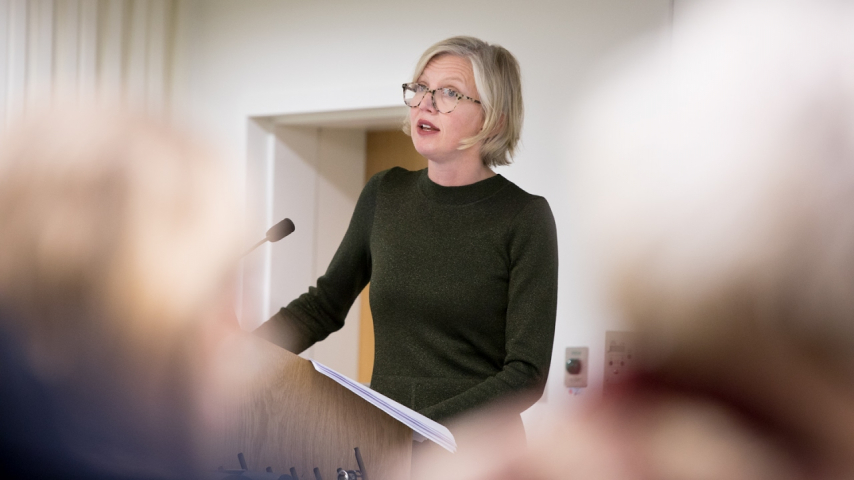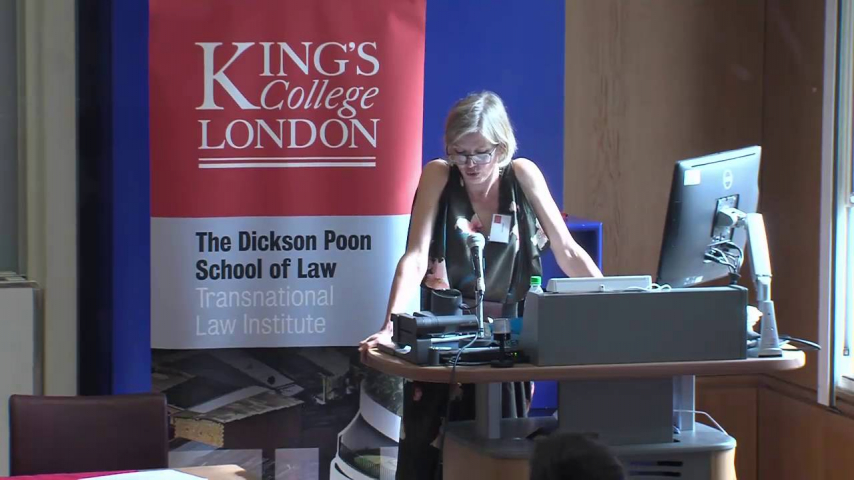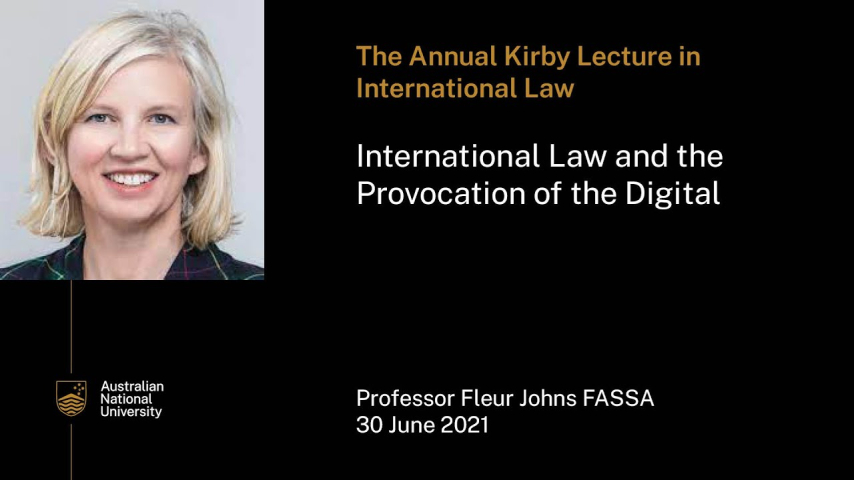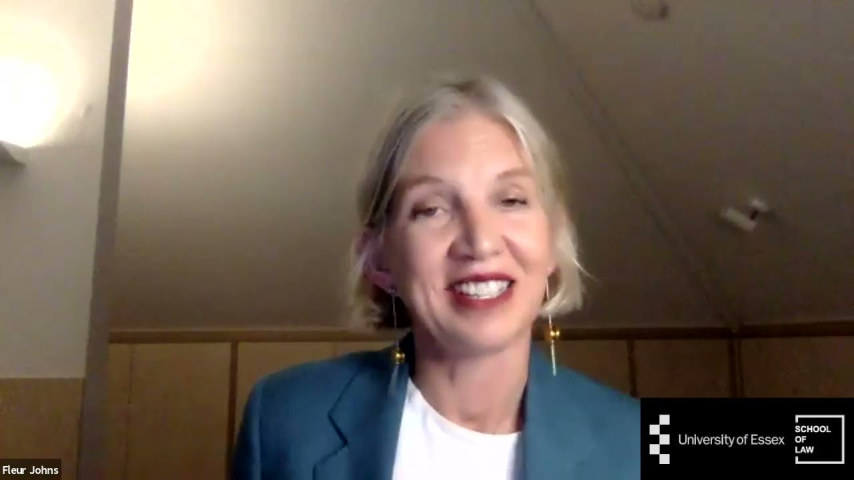
My Expertise
International law, international institutions, global governance, legal theory and the role of technology in global affairs, especially the use of digital technology in development, humanitarian aid, and disaster relief.
Fields of Research (FoR)
Public international law, Law and society and socio-legal research, Law, science and technology, Legal theory, jurisprudence and legal interpretationBiography
Fleur Johns is Professor in the Faculty of Law & Justice at UNSW Sydney. Fleur works in international law, legal theory, law and development, and law and technology. Her latest research has focused on the implications of digital technology for international law and politics, and on the international law of diplomacy. Fleur is an Australian Research Council Future Fellow (2021-2025). She has published six books, the most recent of which are
Fleur Johns is Professor in the Faculty of Law & Justice at UNSW Sydney. Fleur works in international law, legal theory, law and development, and law and technology. Her latest research has focused on the implications of digital technology for international law and politics, and on the international law of diplomacy. Fleur is an Australian Research Council Future Fellow (2021-2025). She has published six books, the most recent of which are #Help: Digital Humanitarianism and the Remaking of International Order (Oxford University Press, 2023) and Connection in a Divided World: Rethinking 'Community' in International Law (T.M.C. Asser Press, 2024). She also has a seventh book forthcoming entitled Global Governance by Data: Infrastructures of Algorithmic Rule (co-edited with Gavin Sullivan and Dimitri van den Meerssche, Cambridge University Press). Fleur has held visiting appointments in Canada, Europe, the UK, and the US and currently serves on the editorial boards of the American Journal of International Law and the journals Technology and Regulation, the Journal of Cross-disciplinary Research in Computational Law, and Science, Technology & Human Values, as well as being an Advisory Editor for the London Review of International Law, the Australian Feminist Law Journal and several scholarly book series. Fleur is a graduate of Melbourne University (BA, LLB(Hons)) and Harvard University (LLM, SJD; Menzies Scholar; Laylin Prize). Prior to entering academia, Fleur practised law in New York and she remains a member of the New York Bar. Fleur was elected to Fellowship of the Academy of the Social Sciences in Australia in 2020 and currently serves on its Executive Committee as International Secretary. Within UNSW, Fleur is affiliated with the Kaldor Centre for International Refugee Law and is an associate of the Australian Human Rights Institute. Fleur was Associate Dean (Research) for the Faculty of Law at UNSW Sydney between 2016 and 2019 and served on UNSW's Academic Board between 2021 and 2024.
Fleur has three children and worked part-time (approximately half-time) between 2005 and 2013.
Fleur's full CV may be downloaded here.
My Grants
- Australian Research Council Future Fellowship 2021-2024 (FT200100656), 'Diplomatic Knowledge, Disasters and the Future of International Legal Order' (AUD$951,471)
- First-named Chief Investigator, Australian Research Council Discovery Project Grant 2018-2020 (DP18010090), 'Data Science in Humanitarianism: Confronting Novel Law and Policy Challenges' (with CI A/Professor Wayne Wobcke, UNSW Computer Science, and PI Professor David Nelken, Dickson Poon School of Law, King's College London) (AUD$511,496).
- Chief Investigator, Australian Cyber Security Studies Centre Research Grant 2015 ‘Data Analytics, Decision Support and Changing Conditions of Global Governance: Human Dimensions of Cyber Security Regulation’ (AUD$30,000)
- First-named Chief Investigator, Australian Research Council Discovery Grant 2011-2013 (DP110102978) ‘Mekong Laws: Scales, Sites and Impacts of 'hard' and 'soft' Law in Mekong River Basin Governance’ (with Prof. Philip Hirsch, Prof. Ben Boer and Prof. Ben Saul) (AUD$300,000)
- Participating Investigator, Social Sciences and Humanities Research Council of Canada Insight Grant 2012-2015, ‘Planning by Contract: An Empirical Study of the Legal and Governance Dimensions of Public-Private Projects’ (Prof. Mariana Valverde and Dr. Susannah Bunce, University of Toronto are Chief Investigators) (CAD$94,275)
- Grant-holder, Council for Australian-Arab Relations Grant 2012-2013, for ‘International Law & the Periphery’, a Conference Co-convened with the American University in Cairo, Egypt, Feb. 2012 (AUD $12,000)
My Qualifications
BA, LLB (Hons), Melbourne
LLM, SJD, Harvard
My Awards
-
Fellow, Academy of the Social Sciences in Australia since 2020
-
Member, Institute for Advanced Study, Princeton 2019-2020
-
Fulbright Scholar Award (declined) 2019-2020
Robert Gordon Menzies Scholarship, Harvard University 1995-1996
Robert Laylin Prize, Harvard University 1996
Elected LLM class speaker, Harvard University Commencement 1996
Robert Craig Exhibition for Current International Legal Problems, University of Melbourne, 1994
Schutt Trust Fellowship, Trinity College, University of Melbourne, 1991
Price Waterhouse Prize for Contracts, University of Melbourne, 1990
My Research Supervision
Areas of supervision
Fleur is currently supervising PhD students working on a range of topics in international law and legal theory, predominantly with a critical legal theory dimension.
My Engagement
Appointments (selected)
-
Executive Committee, The Academy of the Social Sciences in Australia, International Secretary, Chair of International Committee, since end of 2021.
-
Board of Trustees, Association of Members of the Institute for Advanced Study (AMIAS), Princeton, elected 2021
-
Core Ideas Group, Meridian 180 (https://meridian.northwestern.edu), member 2012-2020
-
Elected Member of the Coordinating Committee of the European Society of International Law International Legal Theory Interest Group 2007-2009; 2009-2012
-
Management Committee Member, Refugee Advice and Casework Service, Ltd., 2003-2005; 2009-2010
-
Management Committee Member, International Law Association (Australian branch), 2005
-
Rapporteur, Inter-agency Consultation on Protected Areas, UN Office for the Coordination of Humanitarian Affairs & Harvard Center for Population and Development Studies (1999)
-
Non-Executive Director, Environment Defenders Office (Victoria), 1993-1995
-
Advisory Board Member, Esprit Cares Trust Fund, Esprit (Australia) Pty Ltd, 1992-1994
Editorial roles (selected)
-
Editorial Board, American Journal of International Law, since 2018; re-elected 2022
-
Editorial Board, Science, Technology & Human Values, since 2022
-
Editorial Board, North South Journal of Peace and Global Studies, since 2022
-
International Advisory Board, Hart/Bloomsbury Book Series: Shaping Law: Aesthetics, Value, History, since 2022
-
Editorial Board, Technology and Regulation, since 2019
-
Editorial Board, Routledge Book Series: Politics of Transnational Law, since 2015
-
Editorial Advisory Board, London Review of International Law, since 2013
-
Editorial Board, Leiden Journal of International Law, 2005-2013 (Articles Editor 2005-2010 with Wouter Werner)
-
Editorial Board, Australian Journal of Human Rights, 2005-2015
-
Editorial Advisory Board, Australian Feminist Law Journal, since 2008
-
Editorial Board, Global Change, Peace & Security, 2008-2021
-
Editorial Board, Australian International Law Journal, 2008-2013
-
Editorial Board, Sydney Law Review, 2004 (Book Review Editor) & 2007
-
Primary Editor, Harvard Human Rights Journal, 1996
My Teaching
Fleur has taught LLB, JD and Masters courses in the following areas:
- Public International Law
- Law in Global Context
- Private International Law
- International Human Rights Law
- International Law & the Use of Armed Force
- International Project Finance
- Law, Lawyers & Justice (professional ethics)
- Legal Geographies
- The State and Global Governance
- Theories of International Law
Publications
ORCID as entered in ROS
Videos
Modern states have pursued what James C. Scott characterised as projects of legibility and simplification. Maps, censuses, uniform measures, universal naming conventions, population studies, national economic plans: these are the measures by which modern states have taken stock of their subjects, interests and territories. Market-driven standardization has, to some degree, carried on that tradition, albeit with an orientation away from the state. In either setting, critiques of these practices abound. As criticism has continued, however, the synoptic techniques with which states, international institutions and major market players tend to work have changed. They have got thicker and more dispersed, some to an almost inestimable degree. States and other governance institutions now draw, sometimes in real time, upon immense, multi-source repositories of data, and aspire to do so more. Modes of analysis too have changed. No longer is legibility a precondition for action. Governance practice has come to be informed by methodologies of product and business development that prefer prototypes over plans. States and international institutions continue to plan, but alongside this, they pursue iterative learning gleaned from the release of minimally viable policy mock-ups and rapid evaluation of their reception. Critiques of modernist calculation and design have limited purchase on these practices. Scholars and others concerned about maximizing their potential, and minimizing the violence and wastage that they bring about, must devise new ways of loading questions into prevailing truisms and giving pause to the churn of contemporary governance practice.
Speaker: Fleur Johns is Professor and Associate Dean of Research in the Faculty of Law at UNSW Australia.
Respondent: Stewart Motha is Reader in Law and Acting Dean, Birkbeck School of Law.



